By Amarachi Okeh (Lead Writer)
Nothing prepared Emmanuel Uchenna, founder of PJosh Diabetes Foundation, for his meeting with Samson Tamaraubrakemi, a 17-year-old who had Type 1 Diabetes, and who was sent away by his family because they could no longer afford to take care of him.
Described as one of the leading causes of death globally by the World Health Organisation (WHO), diabetes is a long standing disease that occurs when the pancreas does not produce any or produces insufficient insulin. Type 1 diabetes or juvenile diabetes is an autoimmune disease — where the body attacks itself, in this case the pancreas, causing it not to function. Occurring mainly in children and adolescents, type 1 diabetes accounts for 10% of all cases of diabetes; Type 2 diabetes, which accounts for 90% of all diabetes globally, is the most common type of diabetes. This happens when the body becomes resistant to insulin or is no longer able to produce insulin. Type 2 diabetes predominantly occurs in people aged between 20–79 years. While the cause of juvenile diabetes remains unknown, the risk factors of type 2 diabetes are unhealthy diet, obesity, high blood pressure, physical inactivity, family history and excessive use of alcohol. The third type of diabetes is gestational diabetes, which occurs in some women during pregnancy and poses a threat to the unborn child.
This non-communicable disease, according to WHO, has been steadily increasing for the past 3 decades and rapidly growing in middle-and low-income countries like Nigeria. With a record of 2.7 million people living with diabetes, Nigeria leads as the sub-Saharan African country with the largest number of cases, says the International Diabetes Federation (IDF). The last known nationwide diabetes survey in Nigeria was held in 1992 when the prevalence of diabetes mellitus was at 2.2%, while as recent as 2013 the prevalence was estimated to be at 5.0%.
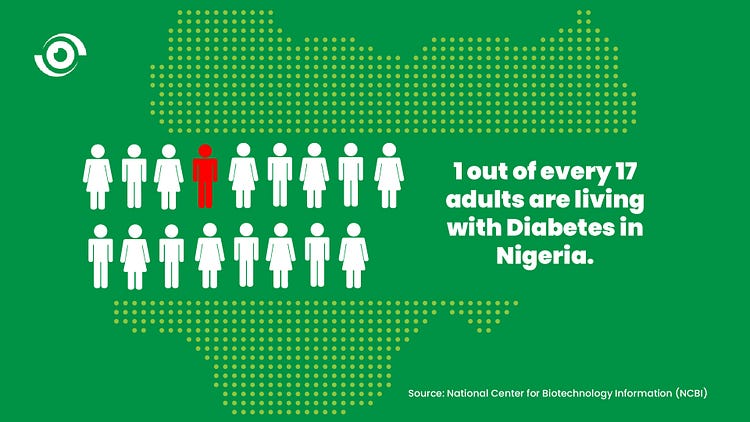
When Uchenna, a member of Blue Circle Voices, the advocacy arm of IDF, started the PJosh Diabetes Foundation, it was meant to raise awareness of the disease. However, he soon realised that educating people about diabetes was not enough, as most of them — who primarily live in rural areas — could not afford comprehensive medical care. His mission expanded to include providing medical care such as consultations, laboratory tests and medications with the assistance of qualified medical doctors, nurses and dieticians, and continuous financial support for the monthly purchase of their medications — all free of charge for the recipients.
The Foundation aims to curb the high mortality rate of diabetes in Africa. They have impacted about 12,500 lives through their outreaches since its inception in 2015. PJosh Diabetes Foundation runs two types of outreach programmes — general outreaches targeted at creating awareness of diabetes in public places and community outreaches that provide full medical services to host communities.
Without financing, people living with diabetes suffer
Diabetes is a lifelong illness and management is expensive, especially for patients from poor homes and vulnerable communities. This is worsened in local communities where people with diabetes are unaware that they have it, do not know how to manage it and lack access to medical care.
Tamaraubarekemi, who was diagnosed at 10, began roaming the streets three years ago, seeking financial help to buy his insulin injections with the hope that if he could raise part of the money, his father would supplement the cost. However, his father’s decision was final. “My father said he is tired,” Samson explained. “He said that this sickness has made him spend a lot of money and that he is no longer going to buy any drugs for me.” Samson’s insulin injections cost more than N20,000 ($52) monthly. Now living with his grandmother, a local masseuse, the Foundation has been taking care of Samson’s monthly insulin injections.
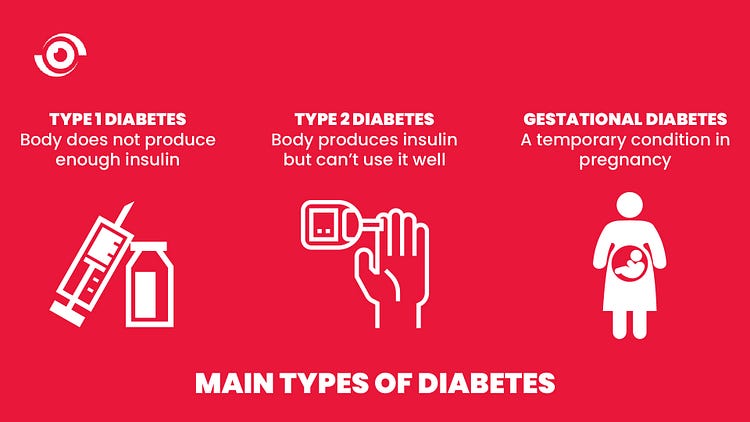
Jessica Chigbu, a woman who was diagnosed with Type 2 diabetes, shared her challenges with buying her monthly medication. “It has not been easy for me as a civil servant whose salary is not paid for months,” she said. Today the PJosh Diabetes Foundation has been consistent in providing financial support for her medications.
While these medications may be available, finances to purchase them is the major challenge. Insulin injections are taken more than once daily while other medications such as sulfonylureas and metformin must be taken daily with a combination of other drugs as prescribed by the physician. A steady daily self-monitoring of their sugar level is also another self-care that is crucial to the health of people living with diabetes.
On average, the cost of a glucometer (a digital device used for measuring blood sugar) is about N10,000 ($25), a strip pack (for measuring sugar in urine) containing 50 strips costs about N5,000 ($13) and insulin injections cost N20,000 or more. For people living with Type 2 diabetes, daily medications costs at least N5,000 monthly, depending on the type or combination recommended by the doctor, and, in some cases, they may also require insulin injections.
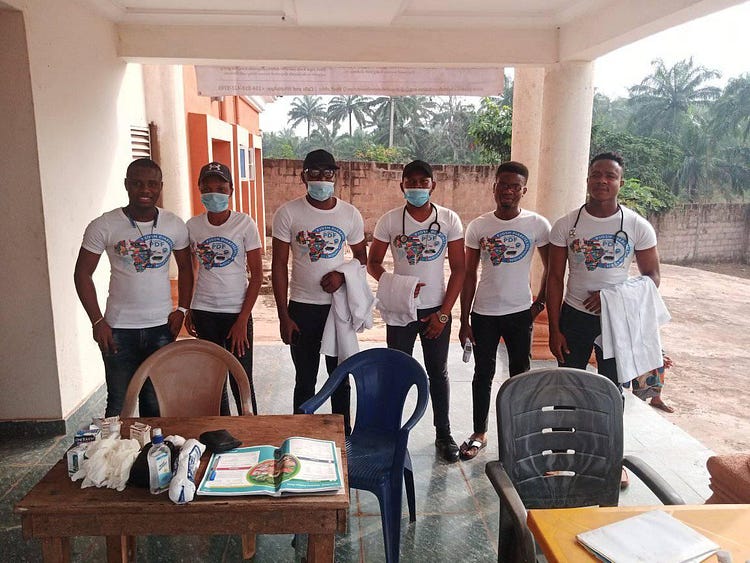
Diabetes changes the lifestyle of people living with it as daily medication and new lifestyles are required. However, the cost of maintaining this new change is usually the most challenging battle. That is why Dr Marcellinus Nkpozi, Head of the Endocrinology Department of Abia State University Teaching Hospital, described diabetes as a “pauperizing illness… People who are supposed to be working are not working because of diabetes and the whole family is contributing and it is not something that will end today or tomorrow. It is a lifelong thing.”
Furthermore, without strict adherence to the new lifestyle, people living with diabetes are at risk of developing several serious health problems like kidney failure, heart attack, stroke, and other diseases affecting the blood vessels, eyes, nerves, and teeth. At the outset of her diagnosis, Chigbu had struggled to believe she was diabetic and found it difficult to give up her lifestyle. “It was difficult for me to give up ice cream until I collapsed and was rushed to the hospital,” she confessed. With a healthy diet, exercise, regular screening and medication, the consequences of diabetes can be mitigated, and complications avoided.
While the government is unable to provide easily accessible medications and treatment for diabetic patients, NGOs like PJosh Diabetes Foundation are filling the gap and responding to the needs of patients in local communities by sensitisation, providing free medical care, consultations and medications relieving people living with diabetes of the heavy financial burden of these services which they really cannot afford.
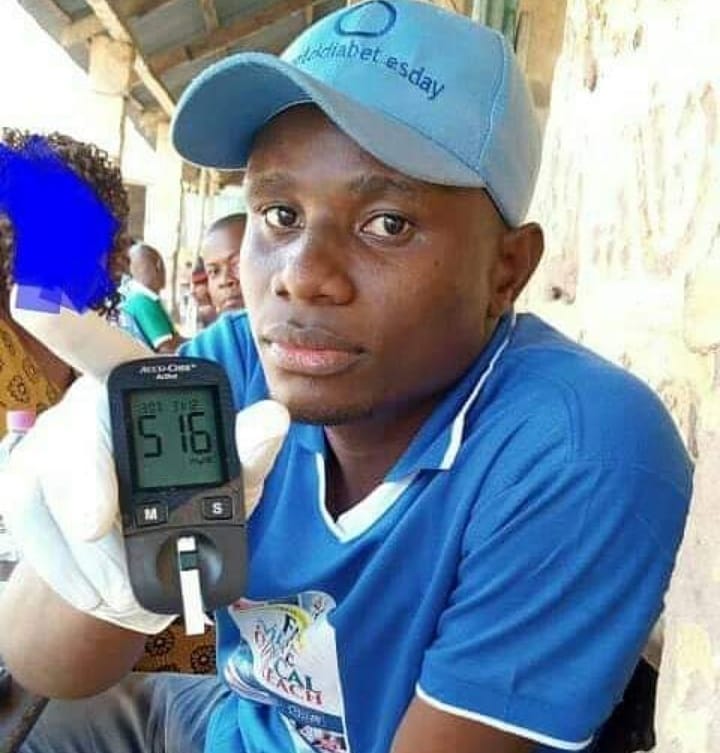
When asked what the government could do to help people living with diabetes, Nkpozi said, “It is important to strengthen the health institutions, subsidize the drugs, devices and materials and then education. In European countries, the glucometers are given free to citizens while the drugs are subsidized as well but such is not obtainable here.” The government needs to do more in educating people about diabetes and, as Nkpozi recommended, subsidize the import duties on medical equipment for the management of diabetes so that it is accessible to more people.
Challenges with sustainability and scale-up
Having attended to thousands of patients and with lots of people living with diabetes whom the Foundation pays for their monthly insulin pens and medications, Uchenna says funding is their major challenge.
“It takes money to manage diabetes,” Uchenna explained. “There’s a catalogue of people with Type 1 diabetes to buy insulin for but we can’t. If the resources are there, why would someone die because of N5,000? When we have the support, we can reach a lot of people but sadly right now we cannot. Everything we do is through sponsorship from people all over the world who are touched by the work we do. It takes money to reach out to these communities, buy medications, insulin injection and transport our volunteers to the outreach venues.”
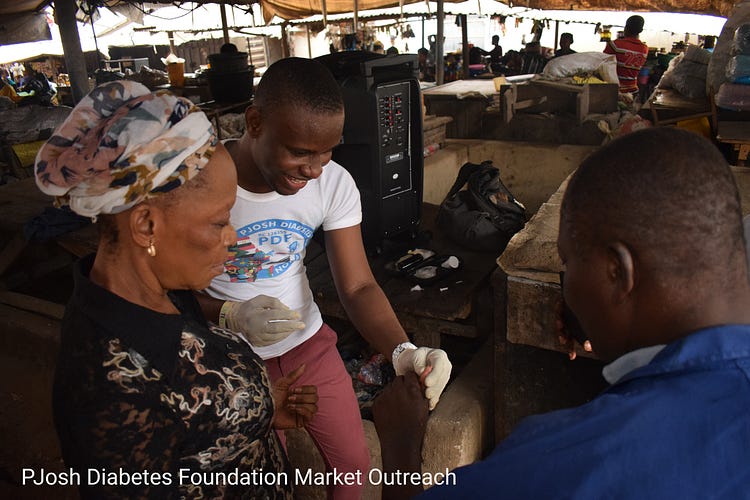
The Foundation is largely supported through crowdfunding. Social media has been instrumental in reaching sponsors as well as sharing their impactful works with people all over the world. Although the Foundation has not received any grant so far, Uchenna and his team are working to get one to scale up the reach and impact of the Foundation.
The Foundation has conducted over 500 outreaches in several villages in Southern states like Abia, Anambra, Imo, and Rivers. While the Foundation is based in southeastern Nigeria, its impact is felt beyond Nigeria as they have created a network of volunteers in other countries like Botswana and Zambia and hope to have a presence in every country on the continent in the coming years. The Foundation also aims to build Africa’s largest diabetes centre in Nigeria in the next 10 years. Uchenna has a tall dream for the Foundation: to be Africa’s reference in diabetes advocacy and care, and he believes a partnership with the government or health companies would be instrumental in realizing this vision.
“We are not just for Nigeria, but the whole of Africa,” he says. “We hope to provide adequate care for every diabetic patient who could not afford to treat themselves.”


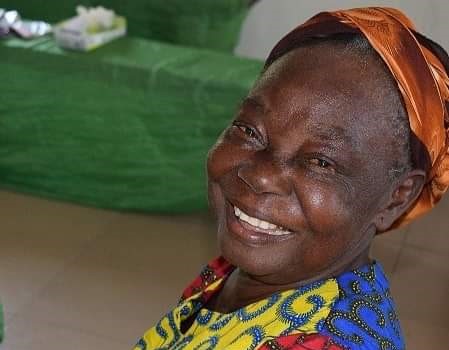
You are really doing a great work. This is an awesome way to solve or at least reduce the economic burdens from DM.Keep it up. Can you extend to SW states.? personally I am also interested in NCDs as a professional.
We always enjoy your articles its inspired a lot by reading your articles day by day. So please accept my thanks and congrats for success of your latest series. We hope, you should published more better articles like ever before
KSACAyurvedha
I know Joshua personally and the work he’s doing with his foundation Pjosh diabetics is amazing. He lives for people living with diabetics. It’s a passion that surpasses imagination. You can support them here: https://www.justgiving.com/crowdfunding/pjoshdiabetesfoundation-pdf-2?utm_term=Y67eKGB6q&fbclid=IwAR2ZQa8O2n_B2d3znBvpjQdM9LWs4EZEFGqwuMc9M_VxkiZJVXJh_9GxrqQ